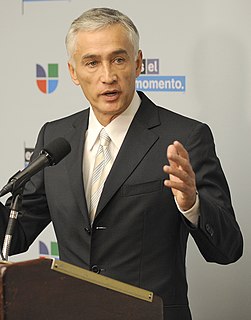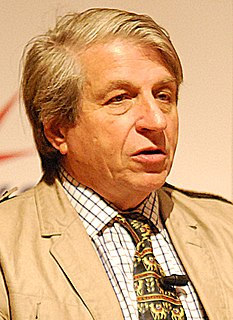A Quote by Isabel Allende
I'm very optimistic because I think that the real strength of a nation like the United States comes from blending cultures. There's no way that you can close the frontiers anywhere. The borders are there to be violated permanently.
Related Quotes
With the decline of American interests in the outcome of this region, there is no glue holding it together. And the countries in this region are invented ... The last guarantor of the region's borders was the United States, and the US has basically said "the hell with it." What you're really having is the collapse of nation-states because they're not nations. They're only states.
The Italian journalist Oriana Fallaci used to say that for her, an interview was like a war. I get the sense that we've forgotten that here in the United States. You turn on the TV, and you see very bland interviews. Journalists in the United States are very cozy with power, very close to those in power.
I don't want to close the door that if any of us were president of the United States that we would sit idly by and watch something like the Holocaust go down. I don't want to close the door on the United States involving themselves and putting a stop to that. Can we spend money on that? Yeah, I think so.
Don't forget Drive-By Media think that most of the so-called victims in the world are in that state because the United States has not been compassionate or fair enough when there have been Republican presidents or Republican Congresses. They don't see the United States as a way out, as a way up. They see the United States as a collection pool, if you will.
Breaking the United States up into a number of pieces could be very good for the integration of those new nations with the rest of the world and the international law whose primary enemy is now the United States government. I think that it would be very good for democracy, for people to be within some hundreds of miles of their nation's capital, as they are in many other countries, so that they didn't have to travel thousands of miles to protest, to exercise their First Amendment rights, but that is the current state of affairs in this overly large, imperial nation.
The president of the United States who has a history of firing people who get close to, you know, him and his allies like Flynn, and like Miss Yates, he will fire them if he believes somehow they're getting too close to him in the investigations. I believe that the president of the United States should not have fired Comey in the middle of an investigation.
9/11 was a signal that we were living in a new world - a world of interdependence, a world in which people could attack the United States not from the outside, but from the inside. It was a sign that the United States, the most powerful country in the world, could watch the cathedral of capitalism at the Trade Center and the heart of its defense at the Pentagon be struck internally, not really across borders, so that borders don't matter anymore.
In Europe, you have very different situation than you do in the United States. In Europe, it's very segregated. And you have the diasporas in Belgium that I saw. And they're being radicalized because they're not assimilated with the culture. I don't think we have that same situation in the United States.
I think the President's decision to withdraw the United States, to keep a campaign promise in Iraq, without leaving a stay-behind force was a mistake, and I hear that from veterans in Wyoming and from parents who lost children fighting in Iraq. We're seeing it, though, around the world. When we, the United States leads a vacuum anywhere, that emboldens others to go in, when there is no sense of deterrence by the United States that lets bad actors move and fill the void.
By the end of the 1960s, the United States owned more than half of the Indian rupee money supply, and that had been acquired through food aid. So I think it's very interesting to see the very long history of how sovereignty and food go together. When some countries remove another country's ability to feed itself, it is a very powerful tool. Imperialist countries, like the United Kingdom, like the United States, have used it for centuries.






































